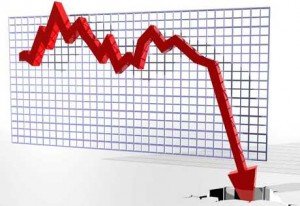Twenty-Nine Reasons to Be Angry And/Or Scared – Still
If you’re not both angry and scared at the world’s current situation, you’re not paying attention.
By Monty Pelerin
If you’re not both angry and scared at the world’s current situation, you’re not paying attention.
attention.
Rained out from a planned and anticipated golf game is not a good thing. As a result, I find myself confined to the house and computer in a less than a jovial mood so decided to list a few problems in the world today. The list grew beyond my intentions.
In no particular order, and hardly complete, is the following enumerated list:
- The Eurozone is imploding and likely will be unable to hold in its present constitution, if at all.
- Fiat currencies are being debased rapidly in a “beggar thy neighbor” attempt to juice domestic economies. Competitive devaluations provide no advantage when other countries match the debauchery.
- More money/debt/federal spending is not economic policy if you view same as being able to fix or improve something. Such action is merely political, a form of political propaganda to convince the masses that the economy is improving. Temporarily propping up reported GDP may provide better headlines, but does not create jobs.
- The purpose of so-called quantitative easing is to shore up bankrupt governments. The action itself is a form of default, albeit in slow motion. Pretending to honor commitments while inflating their value away is a criminal offense, but for government it passes for economic policy.
- Inflation has broken out around the world, regardless of what government statistics. Food and commodity prices are soaring, and these hit the least well-off the hardest. Rising prices of necessities serves to make them poorer and more desperate.
- Citizen unrest around the world does not reflect some idealistic demand for
 Democracy as claimed by our political class and media. This unrest results from increasing hunger, loss of hope and desperation by people of the world. Food prices are being driven beyond their ability to pay. They want something to eat, not some philosophy called Democracy.
Democracy as claimed by our political class and media. This unrest results from increasing hunger, loss of hope and desperation by people of the world. Food prices are being driven beyond their ability to pay. They want something to eat, not some philosophy called Democracy. - Unrest will grow worse as food, energy and other necessities become more expensive. The unrest started in poorer countries but, as prices continue to rise, will spread to more affluent nations. Can “Democratic movements” occur in supposedly already democratic societies?
- The “outs” in oppressive societies want to overthrow the “ins” in order to gain the right to plunder rather than be plundered. Retribution also plays a role. In a very real sense, these movements are little more than large-scale “gang wars” where one gang attempts to gain “turf” at the expense of another. Each battles for the right to own and exploit the “neighborhood.”
- Western social welfare states are broke and unable to honor their commitments. Sovereign defaults and austerity measures are inevitable.
- Citizens of social welfare states, conditioned to believe they have the right to be supported by productive members of society, will not accept austerity measures willingly. Rioting and bloodshed will be most severe in the more pampered societies.
- Political fear will prevent meaningful corrective action. Governments will continue the charade of solvency via continued printing of money. They know it will not improve the economy, but it will enable them to continue to send out checks.
- Inflation will ratchet up higher as a result of money printing. That will only exacerbate civil unrest as the poor will be squeezed even more.
- Developed economies are no longer growing. Most have not had true
 economic growth for decades. Excessive debt and easy credit was used to hide this reality in the US. It enabled living standards not supportable by incomes. Now debt is unsustainable and cannot be serviced.
economic growth for decades. Excessive debt and easy credit was used to hide this reality in the US. It enabled living standards not supportable by incomes. Now debt is unsustainable and cannot be serviced. - A massive liquidation of debt is coming. Some of it will be via contractual paydown. Some of it may be inflated away, but most will be via default producing numerous bankruptcies.
- Job creation is a problem in all western developed countries. In the advanced social welfare states of Europe it has been a chronic problem for decades. The US economy now suffers from the sclerotic disease that characterizes Socialism.
- Decades of increasing regulation on business, employment and incomes have finally taken their toll. These interventions have resulted in an economic climate where obtaining a reasonable return on investment is no longer perceived to be worth the increased risk associated with it.
- Entrepreneurs and businesses withhold capital and refuse to hire in uncertain times.
- Many businesses have voted with their feet, moving jobs and capital offshore to escape onerous regulations and taxes.
- The continuously increasing redistribution of income means more has to be extracted from fewer producers to support the growing dependency class. Anticipated higher taxes now or in the future reduces the incentives to take risk, work hard or employ more people. Economies do not grow or recover under such circumstances.
- GDP numbers are inflated by wasteful government spending. But this spending is merely window-dressing. It creates no new wealth, products or productive jobs. It is another form of redistribution that moves societies closer to bankruptcy. Despite a reported increased in GDP, nothing has improved. That is one reason why GDP can increase without employment increasing.
- Central banks and their banking systems are insolvent. The amount of insolvency is difficult to estimate but is well into the Trillions! Citizens have been looted to cover up this insolvency and bail out Washington’s friends in the financial community. Sadly, all of this has been for naught, as a collapse of fractional-reserve banking is inevitable.
- China is in an inflationary bubble with massive misallocation of resources. Underreported riots are breaking out in China where political unrest is a national sport.
- China is the future economic world power, but that future has not yet arrived. Its current economic condition is likely not sustainable as a result of the distortions of central planning. It is a house of cards, awaiting a collapse.
- Political strife in China will become severe when the economy implodes. How this turmoil is reconciled will determine how quickly China recovers and rises to become a world economic power. The political leaders and their apparatchiks will try to retain control with tougher restrictions on citizens. Ultimately they will fail, but it will prevent the true potential of China from being realized until free markets are embraced. That could be several generations away.
- The US and other Western democracies have solved nothing regarding their economic problems. These countries, including the US, are heading for currency and societal collapses.
- The massive debt problems of Western economies are mathematically impossible to solve. Massive defaults will have to occur eventually.
- Real economic recovery cannot occur until the debt excesses are eliminated. Kicking the can down the road might be considered good political strategy, but it is terribly harmful economically.
- The outlook for peace and tranquility in the world is not good. Governments in danger of failing and falling everywhere are not above using diversions to distract angry citizens. Some countries will probably be treated to “wag the dog” endeavors. Desperate scoundrels will stop at nothing to extend their reign in office.
- I was rained out of a planned and anticipated golf game today. This list could easily have been made longer, but it looks like the sun might now be breaking through. Please don’t assume the reference to the sun is a metaphor pertaining to the economy.
There is another item I could have added to this list, but it is too complex and much bigger and scarier than those above. It deals with the notion that most of the above problems do not result from this particular economic crisis. To be sure, most were exposed as a result of the current crisis, but that merely determined the timing of their revelation. Something else, much bigger and more permanent seems to be at play.
 An economic crisis implies something of a relatively short duration with an eventual return to whatever represents a “normal” state. Recessions are cyclical. But so too was the Great Depression. While it lasted longer and was more severe than a recession, conditions returned to normal within a reasonable period of time.
An economic crisis implies something of a relatively short duration with an eventual return to whatever represents a “normal” state. Recessions are cyclical. But so too was the Great Depression. While it lasted longer and was more severe than a recession, conditions returned to normal within a reasonable period of time.
What we are in, it appears to me, is the beginning of a massive secular change that will alter the way we view countries, economies and institutions. It is much bigger than an economic cycle and likely will represent an epic movement in terms of history. The history books a hundred or more years from now will recognize what happened more clearly than contemporary participants are able to do. The changes will be massive and glacier-like in movement. No generation alive today will see the end of this massive secular change.
To be continued on the next rainy day.
“Monty Pelerin” is a pseudonym derived from The Mont Pelerin Society. The writer has no connection with the Society (other than coincidence of philosophy). Nothing said by me should be considered to be representative of the views of the Mont Pelerin Society or any of its members. “Monty Pelerin” blogs at Monty Pelerin’s World
Editor’s note: This column was first published in June of 2011. Nothing has changed except for maybe getting worse.
Help Make A Difference By Sharing These Articles On Facebook, Twitter And Elsewhere:
